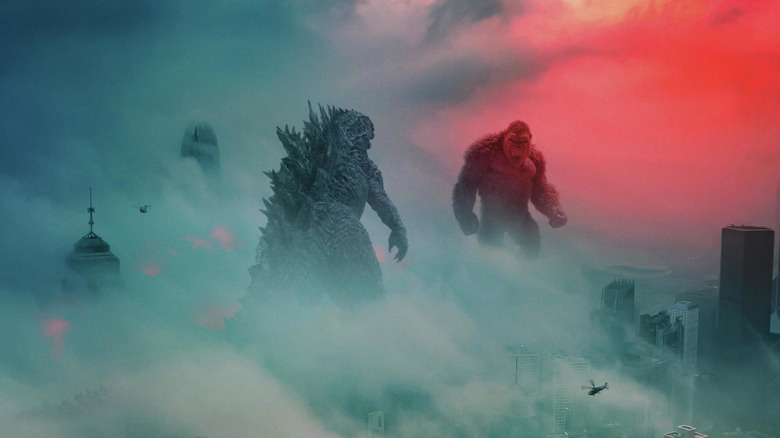Hollywood Can No Longer Depend On China – Here's What That Means, Good And Bad
It has been a rough few years at the box office, to put it as mildly as one can. The pandemic completely upended the movie business as we know it, with theaters around the world shutting down entirely for months on end. Even after they reopened, the recovery has been much slower than expected. It certainly didn't help that last year's SAG and WGA strikes hugely impacted this year's output from Hollywood as well. It's been one thing after another. Amidst all of this, American studios have had to contend with one big, financially consequential truth: China can no longer be depended on to help goose ticket sales for blockbuster films.
For over a decade before the pandemic hit in 2020, Hollywood studios had been catering to Chinese audiences, even going so far as to self-censor films to help ensure that they could play in the country. At times, that paid off handsomely. Just look at 2018's "Venom," which made a staggering $856 million worldwide in 2018 despite earning largely terrible reviews from critics. A whopping $269 million — or more than 31% of the film's total gross — came from China. To illustrate the way things are changing though, it's worth pointing out that 2021's "Venom: Let There Be Carnage" wasn't even released in China. It had to settle for $506.8 million worldwide.
Hollywood blockbusters have suffered a steep drop in ticket sales from China, where local films now account for 80% of revenues.@tgbuckley and @soheefication in this week's Screentime.https://t.co/SzrMXSsFq4 pic.twitter.com/pNyDwh1xqk
— Lucas Shaw (@Lucas_Shaw) August 26, 2024
The above chart from Bloomberg reveals that even the movies that are being released in China these days aren't doing nearly what they used to do in the country. The "Apes" franchise is arguably the most startling example. "War for the Planet of the Apes" made $490.7 million worldwide in 2017, with $112.2 million of that coming from China. This year's "Kingdom of the Planet of the Apes" made $397.3 million globally, but only earned $29 million of that from China. It's a massive difference. Be that as it may, it's a new reality that Hollywood must accept. That acceptance will bring with it some good and some bad.
Hollywood relied too heavily on China before the pandemic
It's not hard to see why Hollywood began chasing Chinese box office dollars. China overtook the United States in ticket sales for the first time in 2015. That was a watershed moment that represented a gold rush of sorts. The problem is that Chinese censors are very strict, with only a certain number of imported films allowed to play in the country's theaters in a given year. That number has only decreased in the pandemic era, with the country instead opting to focus on homegrown titles.
This has been effective in many ways, with movies like "The Battle at Lake Changjin" finding massive success. The war propaganda film earned a staggering $859 million — almost all of it in China — to become the biggest movie of 2021 globally. The thinking has evolved to "Hollywood needs China more than China needs Hollywood." On some level, that's proven to be correct. Movies like "The Batman" bombed in the country despite doing big business elsewhere all over the world. That said, American studios were in danger of becoming over-reliant on China. In many ways, it's better that this no longer has to be the case.
Look at "Warcraft," which was at one time the biggest video game movie ever. It made just $47.3 million in North America, a catastrophe for a film with a $160 million budget. However, it wound up with $439 million worldwide, with a ridiculous $225.5 million take from China straight-up bailing out Legendary on that one. That number certainly looks good on paper, and it helps come time to answer to the shareholders. However, it's important to understand that only so much of that money makes it back to the studio in the end.
Even under the best of circumstances, a studio can expect to see roughly half of what is earned at the box office returned to it. Because of international taxes and other fees, China only ends up returning about 25% of all money made from ticket sales in the country to the studios. So, in the case of "Warcraft," we're looking at about $56 million going to the bottom line, give or take. That's sure as heck not nothing, but it illustrates why Hollywood was playing a slightly dangerous game in the first place. Relying on that money was never a great long-term plan.
Hollywood needs to adjust expectations regarding China's box office
In some cases, China is still an essential part of the equation. Just look at "Godzilla vs. Kong," which made $467.8 million worldwide in 2021, including a whopping $188.7 million from China. That movie was essential in getting theaters back on their feet after the shutdown, and the financials straight-up don't work without China. But that's now an exception rather than the rule. Studios can't rely on China to be there when putting a movie together. There was a point when budgeting a "Transformers" movie north of $200 million made some sense — because Chinese audiences would turn up at a certain, almost guaranteed level. Without that, studios need to adjust expectations and plan accordingly.
I've long argued that Hollywood needs to all but say goodbye to China, opting instead to consider any box office from the country as icing on the cake. Fortunately, it seems like that mentality is indeed taking hold.
"Most, if not all, studios project zero revenue from China now at the green-light process," Chris Fenton, author of "Feeding the Dragon," a book about the Chinese film market, explained in that Bloomberg report. "If a film eventually makes money in China, it's now viewed as gravy." IMAX is similarly adjusting its strategy in the country, utilizing its screens for homegrown Chinese films as well as Hollywood imports.
Let's also not forget that it was reported in 2017 that Chinese theaters were shortchanging Hollywood, with as much as nine percent of ticket sales in 2016 going unreported. That represents millions in lost revenue (and the shares of that revenue were already relatively small). There was little recourse at that time because studios needed China to make a number of upcoming blockbusters make sense. They were depending on that money in many cases. That no longer being the case has its downsides, but it also might lead to some rationalization.
Is a lack of reliable Chinese box office dollars going to hurt some movies? Almost certainly. But Hollywood not having to cater specifically to Chinese censors, not having to remove certain scenes from edits, and not being part of that machine, is almost certainly a good thing. Ideally, it might lead to some actual responsibility when it comes to Hollywood's ongoing budget problem. It also might lead to some movies not getting the green light. Then again, should those movies be made in the first place if their success hinges on doing huge numbers in a single country that might impose huge restrictions on the content shown on screen? Maybe not.


